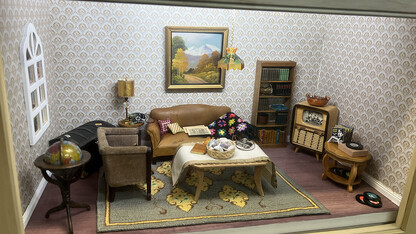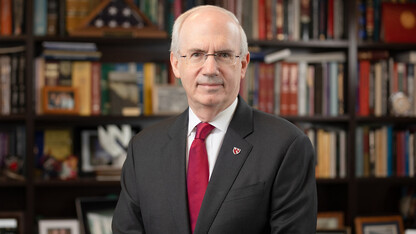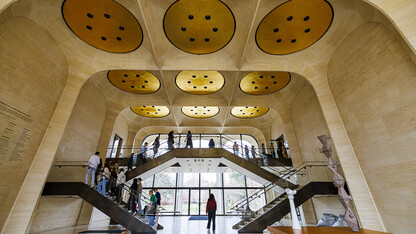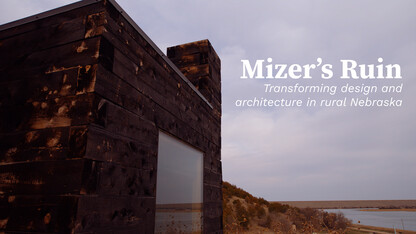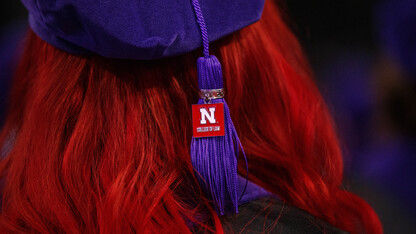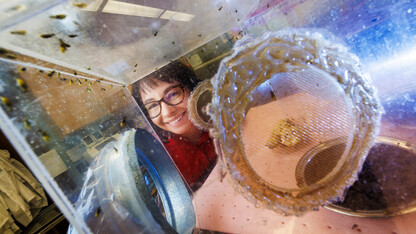· 4 min read
Nebraska’s POW/MIA chair to honor Chinn family

When Randy Chinn takes his seat in the lower northwest corner of Memorial Stadium on Nov. 10, he’ll pay special attention to the American flag flying, and he’ll remember the sacrifice his father, Army Master Sgt. Leonard K. Chinn, and many other military men and women have made for their country.
“He never scored any touchdowns or hit any home runs, but he did a lot for a lot of other people,” Chinn said. “The ‘ol flag’s still flying. So many people don’t realize it when that flag is flying over Memorial Stadium, but think of the past people who have done that for us.
“That flag is still there.”
At 11 a.m. on Nov. 11, the world will mark the 100th anniversary of the armistice that ended the hostilities of World War I. To commemorate this event, Memorial Stadium has designated a special POW/MIA chair. Each game this season, a decorated veteran of U.S. military service will take his or her post next to this unoccupied chair in honor of the more than 800 Nebraskans who were lost in combat, but whose fate remains “UNKNOWN.”
A nearby plaque reinforces the importance of the chair — “You are not forgotten. Since World War I, more than 92,000 American soldiers are unaccounted for. This unoccupied seat is dedicated to the memory of those brave men and women and to the sacrifice each made in serving this country. …”
The unoccupied chair is located in North Memorial Stadium, Section 33, Row 18, Seat 27.
Chinn, a 70-year old retired firefighter from Columbus, will sit next to the POW/MIA chair, along with his children, Todd and Becky, during Nebraska’s football game against Illinois. The game allows the Chinns to celebrate the memory of Leonard Chinn, Randy’s dad. Leonard was 33 when his family received confirmation on April 30, 1951, that he had died in North Korea, having been a prisoner of war since Dec. 1, 1950.
“We’re very, very honored, our family, to have that done for him,” Chinn said of the designated POW/MIA chair. “But also, it’s not just about our dad. It’s about the rest of the families that went through what we went through, plus the veterans that did come home from other wars.”
Chinn had already served in World War II in the Pacific Ocean theater. He re-upped and went to Korea, where he was a member of Company D, Second Engineer Combat Battalion, Second Infantry Division.
“Here’s a man that took over some guns and let his men escape so they get could get out of there when the Chinese were overrunning their position,” Chinn said. “Here’s a man who knew he had a wife and two children in Fort Lewis, Washington, but still went on and did that.”
Chinn and his brother, Rodney, spent decades uncertain of the whereabouts of their father’s remains. After their mother, Irene, died in 2002, Randy read an article in an American Legion magazine, where saw an 800-number to call for families that wanted updates on lost family members at war. North Korea had turned over many American remains in 1993 to Hawaii.
Leonard’s two sisters provided DNA samples to help the process, but not until a 2014 family update meeting in Minneapolis did analysts ask Randy for a cheek swab for his DNA.
Finally, on July 12, 2018, the family received word that Leonard’s remains had been identified. They arrived at Omaha Eppley Airfield in September.
“It’s what America’s about. For other families like us, it gives them hope,” Randy said. “It shows it can be done, and we’re a caring nation. Our government spent a lot of money for the laboratories in Hawaii, and then the one at Offutt Air Force Base.
Nearly 8,000 Americans are still unaccounted for from the Korean War, but Randy is thankful and relieved to know his father’s ashes are now in an urn buried above his mother’s casket in a cemetery near Silver Creek.
“That’s so much relief for myself and our family. We know,” said Randy, who was 2 when his father was captured, and has no memories of him. “But there will always be unanswered questions. Would he have ever taken me to a football game? Would we have ever fished together, hunted together? I’ll never know that. But I do know where his ashes are now.
“He’s my hero. A lot of guys have sports heroes in baseball, basketball, football, whatever. But he’s an all-around hero.”
